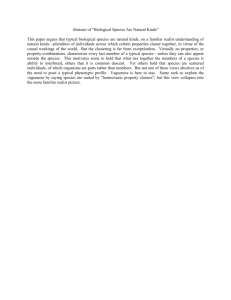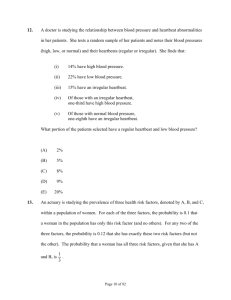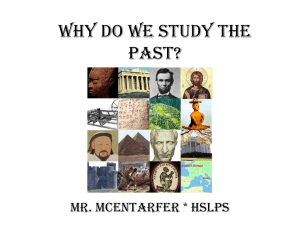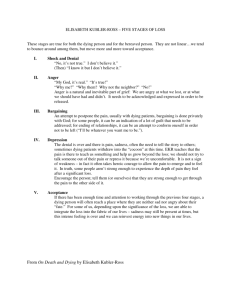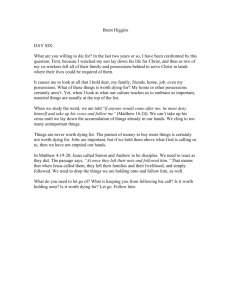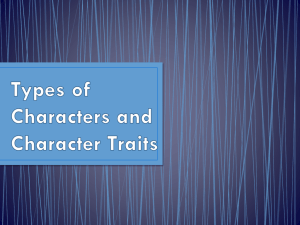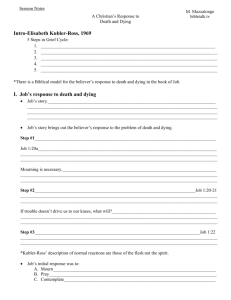An Analysis of Joyce Carol Oates*s excerpt from We
advertisement
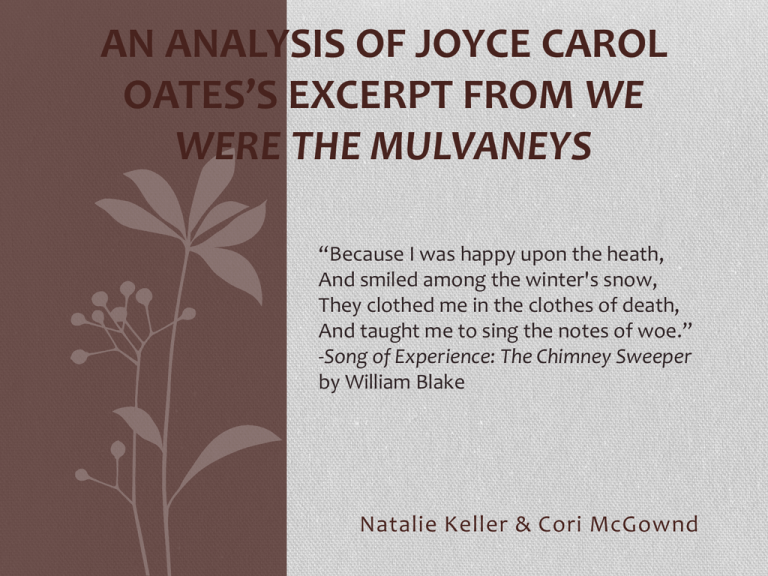
AN ANALYSIS OF JOYCE CAROL OATES’S EXCERPT FROM WE WERE THE MULVANEYS “Because I was happy upon the heath, And smiled among the winter's snow, They clothed me in the clothes of death, And taught me to sing the notes of woe.” -Song of Experience: The Chimney Sweeper by William Blake Natalie Keller & Cori McGownd What Statement The author characterizes Judd Mulvaney as an innocent Romantic who shifts his perspective to an experienced Realist. Overview Romanticism Other World Realist Literary Elements • Syntax • Diction • Juxtaposition • Tone Shifts • Repetition • Use of Parentheses • Foreshadowing • Irony • Symbolism • Point of View • Organization Shifts in Syntax & Tone Proves Transition from Romanticism to Other World Romantic Other Worldly • Line 1-8 “That time in our lower driveway, by the brook…Fastflowing clear water, shallow, shale beneath, and lots of leaves.” • Line 16-19 “I leaned farther and farther over the rail staring into the water and I was moving, moving helplessly forward, it seemed I was moving somehow upward, rising in the air, helpless.” • Tone: Carefree – line 2“I was straddling my bike staring down into the water.” • Tone: Curious – line 15 “oh boy! we-ird! Scary and ticklish in the groin as I leaned farther…” Repetitious Phrases Prove Innocence • Line 16-19 “I leaned farther and farther over the rail staring into the water and I was moving, moving helplessly forward, it seemed I was moving somehow upward, rising in the air, helpless.” • Line 18 & 19 • “helpless” • “moving” Lack of Repetition in the Realist Perspective Reflects the Character’s Loss of Innocence Repetition Earlier Within the Realist World Of verbs: Lines 16-17 About Death: Lines 34 • “moving, moving” • “dying, dying, dying” • “farther and farther” Of Heartbeat Lines 20-23 • “ONEtwothree ONEtwothree!” • “Every heartbeat is past and gone! Every heartbeat is past and gone!” Of knowledge: Lines 39 and 66 • “I didn't know” • “not to know what I knew” Use of Parentheses Foreshadows Realism • Line 9 – “The brook was flowing below left to right (east to west, though at a slant)” • Line 11 – “and I stood immobile leaning on the railing (pretty damned rotten: I’d tell Dad it needed to be replaced with new planks, we could do it together)” Use of Parenthesis Shows the Transition in Judd’s Perspective, But Also Emphasizes His Constant Struggle to Accept It Line 43-45 •“(Might as well buy our vehicles mudcolored to begin with, saves time, was dad’s logic)” Irony Proves Shift from Romanticism to Realist • Lifted off Earth to reassess his own life from new perspective • Line 34-48 “Though on a farm living things are dying, dying, dying all the time, and many have been named, and others are born taking their places not even knowing that they are taking the places of those who have died.” Symbolism of the Heart & Diction Proves Life •Line 19-22 – “in that instant aware of my heart beating ONEtwothree! ONEtwothree! thinking Every heartbeat is past and gone!” Point of View, Stream of Consciousness, & Organization Proves Transition • Line 31-34 – “Every heartbeat is past and gone! Every heartbeat is past and gone! In a trance that was like a trance of fury, raging hurt Am I going to die? because I did not believe that Judd Mulvaney could die.” • 1st Paragraph- stream of consciousness • 2nd Paragraph- “Them, too. All of them. Every heartbeat past and gone.” – Telegraphic The Character’s Use of Tone & Voice Reflect His Shift in Perspective Tone Line 40-55 • “aged” • “rotted” • “scared” • “snag” • “terrible” Voice Line 42-46 • “mud-colored Ford pickup” • “barreling up the drive, bouncing and rattling” • “the truck’s doors were neat curving white letters” Imagery Words are Used to Highlight the Differences Between the Romanticist World and Realist World. Romanticist World Lines 17-22 • “staring” • “moving” • “rising” • “beating” • “shiver” • “thinking” Verbs used to describe Judd Realist World Lines 42-46 Describes writing on the • “neat” truck • “curving” Describes color of the truck • “mud-colored” • “barreling” Describes actions of the truck • “bouncing” • “rattling” The Commas, Semicolons, and Colons represent that the revelation of Judd’s Understanding of Death has Shifted his View Into a Realist One Lines 38-39 • “So I knew I wasn’t a dope, but I didn’t know– not really.” Line54-58 • “And I looked after them, these two people so remarkable to me, my dad who was like nobody else’s dad and my big brother who was– well, Mike Mulvaney: ‘Mule’ Mulvaney– and the most terrible thought came to me.” Dialogue is Used to Show Judd’s Connection to Reality and People. Line 51 •“‘Hey Ranger-kid: what’s up?’” How I Can Relate-- Death Child View Matured View • Great Grandmother dying while in elementary school • Mr. Wade’s recent death
